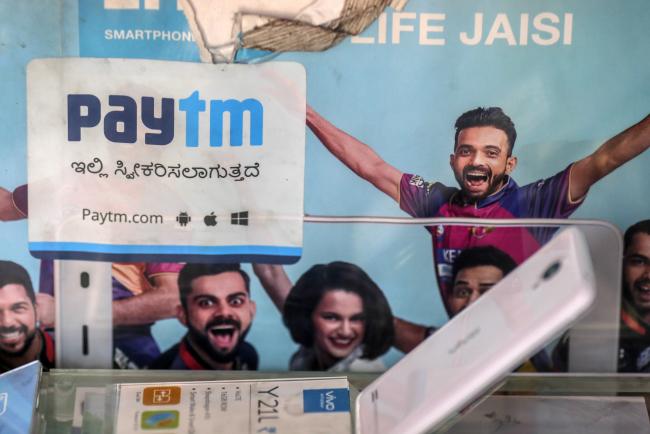 © Bloomberg. A sign for PayTM online payment method, operated by One97 Communications Ltd., is displayed at a store selling mobile phones in Bengaluru, India, on Saturday, Feb. 4, 2017.
© Bloomberg. A sign for PayTM online payment method, operated by One97 Communications Ltd., is displayed at a store selling mobile phones in Bengaluru, India, on Saturday, Feb. 4, 2017.(Bloomberg) — Paytm Payments Bank aims to create the world’s largest digital bank with 500 million accounts, envisioning an online financial services provider of everything from wealth management to credit cards and stock market trading.
The bank, backed by the country’s largest digital wallet of the same name, launched formally Tuesday and is targeting people who don’t have access to professional financial services. That aligns with Prime Minister Narendra Modi’s ambition to broaden access for the under-banked in the nation of 1.3 billion people.
“We are unveiling our money market fund, launching our debit card and we’ll have the capabilities to allow enterprises to open business accounts,” Paytm founder Vijay Shekhar Sharma said in a phone interview that coincided with a formal inauguration in New Delhi attended by Finance Minister Arun Jaitley. “Digital payments was our entry point, we want to become a vertically-integrated financial services company.”
India’s government is supporting financial technology with incentives and a string of initiatives such as digital lockers and user-authentication based on its digital identity program, Aadhaar. Paytm was one of fewer than a dozen entities that secured permits to start payments banks, which can accept deposits and remittances but cannot lend.
It said it will operate a mobile-first bank with zero fees on online transactions and no minimum balance. Paytm Payments Bank is majority-owned by Sharma. One97 Communications, which operates Paytm and is backed by Alibaba (NYSE:) Group Holding Ltd. and Jack Ma’s Ant Financial, holds the remaining 49 percent. The bank grew out of Paytm’s digital wallet, which amassed over a hundred million customers after India took high-denomination bills — or nearly 90 percent of the value of cash — out of circulation last November.
Sharma may have found a way around the regulatory hurdles that bar lending. One97 Communications will introduce a charge card and offer monthly installment-based loans, he said. “We will launch share trading and insurance products very soon,” he added. “We want to become an internet-age financial services company.”
Read more: Night Lights, Train Trips Help Study India’s Cash Ban Impact
In India, the traditional banking system veers heavily toward those with wealth as poorer citizens struggle to pay bills or transfer money to relatives. “Buying insurance and investing through our wealth management products will become widely accessible through the payments bank,” said Sharma.
Despite the proliferation of smartphones and cheap data rates bringing internet access to millions, traditional lenders have yet to build large digital banking capabilities. And Indian consumers aren’t yet entirely comfortable with digital financial startups. Sharma said that works in Paytm’s favor.
(An earlier version of this story corrected the ownership structure of the digital bank.)
(Updates with Indian initiatives from fifth paragraph.)
Fusion Media or anyone involved with Fusion Media will not accept any liability for loss or damage as a result of reliance on the information including data, quotes, charts and buy/sell signals contained within this website. Please be fully informed regarding the risks and costs associated with trading the financial markets, it is one of the riskiest investment forms possible.
Source: Investing.com




























